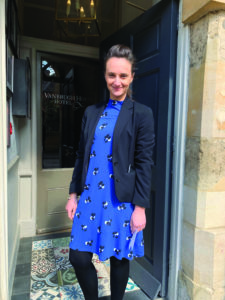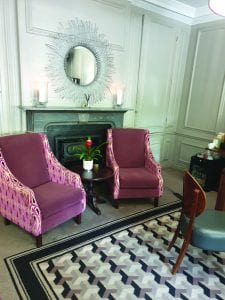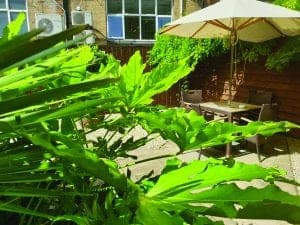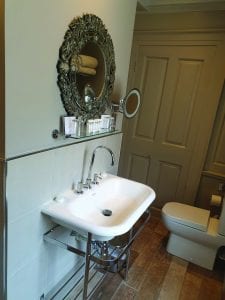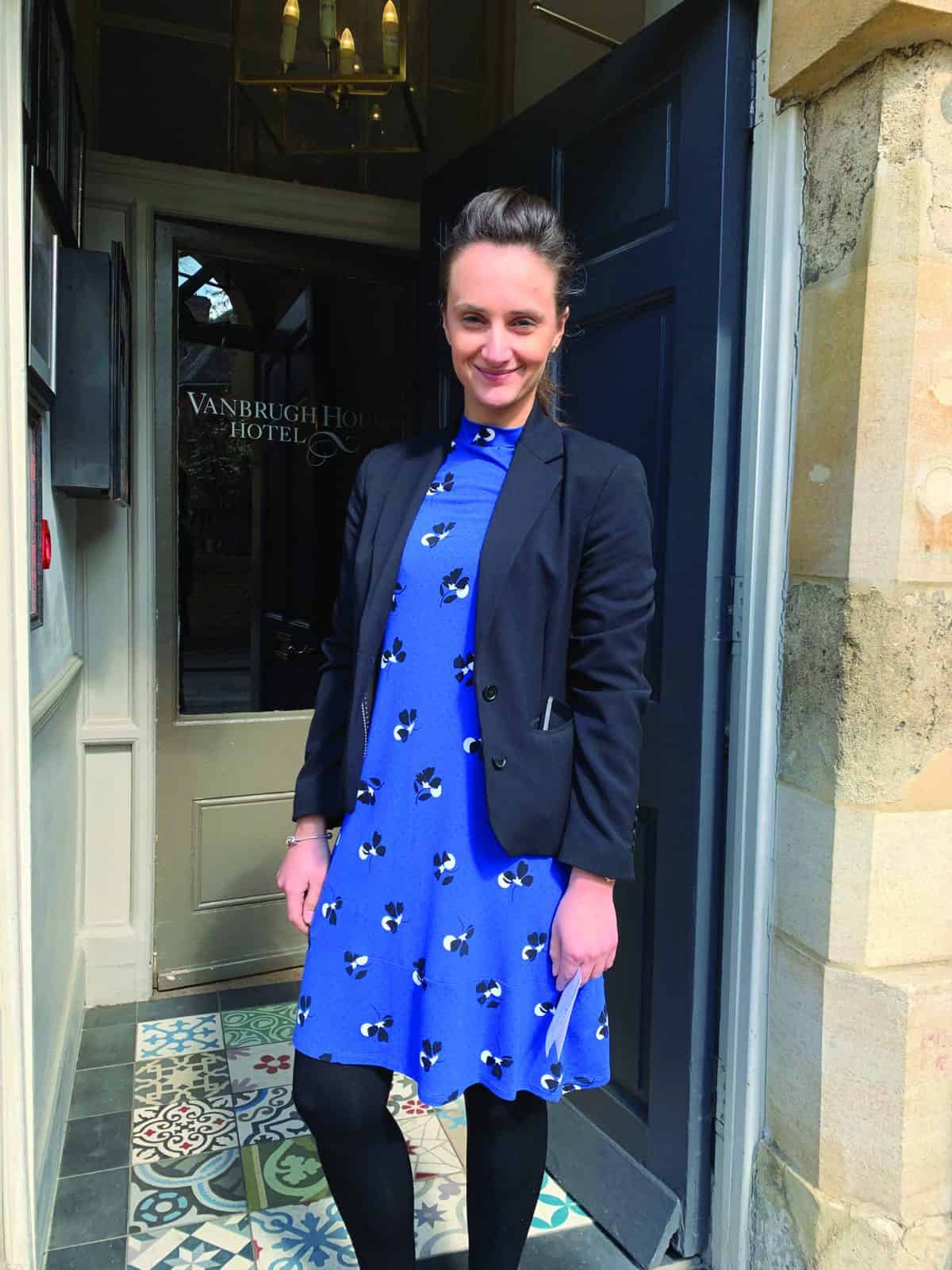
Luxury B&B Cristina interview
Inside Vanbrugh House, around 95% of Oxford boutique hotel guests are either from the UK or Asia. Bill Lumley stays a night at the formidable property located in the heart of the university city
Situated a short walk from the Ashmolean Museum, the Oxford Playhouse, many colleges and the main shopping streets, the 22-room Vanbrugh House boutique hotel could hardly be better placed for exploring the sights of perhaps the world’s most famous historical university city.
It stands just yards from the Saxon tower of St Michael at the Northgate, which has overlooked the city for more than a thousand years. The hotel is also situated opposite the university’s debating society the Oxford Union.
Five and a half years ago the building, dormant after having previously been used as council offices, was taken over by Splendid Hospitality Group, a family-owned business that owns a variety of luxury and boutique hotel properties across the UK.
Original features in Vanbrugh House
The building had fallen into a state of neglect. Splendid Hospitality undertook a certain amount of refurbishment to turn the office space into 22 bedrooms while carefully retaining much of the intimate character of the 17th and 18th century building.
The ground floor of the Oxford hotel showcases beautifully panelled rooms. Hidden behind the cellar walls lay vestiges of the original fortifications, which were built to guard Oxford from Viking invasions, dating back to the time of King Alfred.
The reception at the luxury hotel also features beautiful original delft tiling that has been commented on by the famous Oxford Ashmolean Museum, which specialises in archaeology. The Royal Commission on Historical Monuments mentions the painted alcove as being of special interest.
Boutique credentials
Vanbrugh House differs from a conventional hotel in more ways than one. Prior to coming to Vanbrugh general manager Cristina Raduica says she had never actually stayed in a boutique hotel, loyalty schemes having kept her from straying beyond particular hotel brands.
She came to Vanbrugh just five months ago, and the key task she and the team have, she says, is to ensure the hotel fulfils its promise as a distinctive boutique hotel, one that guests will remember.
“Rather than thinking of the building being just a hotel we think of it as our home,” she says. “Check in is not a typical hotel check in, which involves queuing at a desk. Instead, guests sit down to be greeted, with the offer of a cup of tea or coffee to make them feel at home. We don’t just tell guests how to go to their room, wherever possible will show everyone to their room.
“We try to offer as personalised service as we can.”
Guest profile
Guests staying at the Vanbrugh House Hotel are overwhelmingly visiting the city for leisure rather than corporate purposes, and are roughly broken down as 65% north American tourists, 30% Asian tourists and around 5% European.
When it first opened as a boutique hotel, Vanbrugh House used to provide a full service hotel offer including breakfast, lunch and dinner. “Over the years many big restaurant chains have moved into the area, and it has since become impossible for small hotels to compete against them by providing dinner in house,” explains Cristina. “Covers on an average night here were between three and five, which was not really sustainable from a business perspective.”
The owners therefore decided a few months ago to stop offering breakfast for a period of time during which instead they struck an agreement with Bill’s restaurant next door for breakfast. However, Cristina tells Luxury Bed & Breakfast magazine: “We are planning now to bring breakfast service back in house to reinforce the personalised nature of the hotel.”
Work has begun downstairs at the hotel to redevelop the breakfast room, which as we go to press is expected to open first week of September. However, she says the dining area only be offering breakfast and not lunch or dinner, when she says guests will be spoiled for choice as to where they can eat.
“We are extremely lucky that our location in the city means that guests have such a wide choice of options for dining out all within easy reach of the hotel. We are really looking forward to being able to offer our guests breakfast once again when the refurbishment on the dining room is complete.
The owners have been limited to some degree by the level to which they have been able to conduct renovations. For example they have not been allowed to install air conditioning in the rooms because of the structural changes that would be required. However the dining room was already in situ, so they are simply having to refurbish it as a breakfast dining area.
“We are not having to make any structural changes there,” says Cristina.
Bedroom decor
The bedrooms all feature quirky lamps, rococo mirrors and several bright cushions which form a contrast to the dark classical colours of the walls and the wooden panelling, the original fireplaces and the sash windows.
The hotel has a capacity for a total of 44 guests, all of whom will be accommodated in the breakfast area when it reopens if they choose to take the most important meal of the day at the same time.
Not being allowed to fit any air conditioning is the biggest challenge, she says, when it comes to explaining to guests why they can’t provide facilities. “We simply are not allowed to, just as we cannot change any of the windows facing the main road, since that would change the aspect of the building. There are therefore downsides to having such a lovely building with an amazing history, restrictive when it comes to modernisation to meet our guests’ requirements, and we do all we can to explain this to our guests prior to visiting in order that their expectation are met,” she says.
Hotel guests
Oxford is busy all year round but is at its busiest at the start of summer during the graduation period. In December and January, the city and therefore the hotel tend to be less busy, but Cristina says: “With just 22 bedrooms it makes it quite easy to fill.”
The hotel has had its fair share of celebrities who have come to stay, she says. “Being close to the theatre also brings us a fair number of actors.”
The hotel has also had quite a few marriage proposals taking place, she says, and the week before my visit, two couples that had married that weekend decided to spend their first honeymoon night with us.
Luxury rooms
The bedrooms are currently equipped with 32-inch TVs with, beneath them and built into a drawer, a panel of sockets that accommodates USB or other audio and/or visual plugs, enabling guests to watch whatever form of entertainment that they have brought with them on a larger screen.
This was very popular five years ago, according to Cristina, but with the evolution of digital technology since, it has had its day.
“In the next month we are looking to change it,” she says. “We will be replacing the 32-inch TVs with 43-inch or 55-inch models and at the same time we will get rid of the black boxes fitted to the drawers beneath the TVs. Unfortunately, all our drawers are customised, handmade for each of the rooms, which means we are having either to find the same company that can remove the black boxes and replace them with panels of the same size, or just replace the entire drawers.”
Unlike many hotels, each room at Vanbrugh House is different with its own history, and each is named with a framed history of the corresponding history of the room.
Two of the rooms have gardens. We stayed in one of these, the Vicarage Suite, and we found the garden perfect, both for eating dinner – we chose a burrito from down the street – and for breakfast, which we bought in as nearby Prêt a Manger.
“The gardens are not usually a specification for guests when they are booking with us – it comes as a bonus for them. says Cristina.
Despite being situated in the heart of Oxford, the garden is a peaceful place to unwind, undisturbed after a busy day exploring the historical city.
The Vicarage Suite has twin bath tubs and a stand-alone, glass-walled shower cubicle. Shower rooms in the standard doubles are smartly presented with White Company toiletries.
Competition challenges
Originally formed with the establishment of a river crossing for oxen in around 900AD, Oxford is now the 52nd largest city in Great Britain, and the famous university city and county town of Oxfordshire is growing fast.
Cristina says: “As it grows, there are quite a few new hotel properties that have been built in the last five years since we opened, branded and independent. A new Hilton is to open soon at Westgate and this year quite a few hotels are opening or undergoing refurbishment nearby, so demand for us is falling slightly due to the increase in competition.”
She adds: “There are also quite a few serviced accommodation properties including luxury apartments, and of course we have Airbnb, which is still competition for us even through it is a different level of clientèle. It still dilutes our market. And that is very unfair competition since Airbnb doesn’t have to comply with anything like the costly levels of regulation that we have to.”
Guest perception
She says a certain number of guests seem somewhat confused over the comparatively high price for a stay at Vanbrugh House, when actually she says it is a matter of the location of the hotel in the heart of the city, and its associated history and the level of service received.
“Obviously in our location we lack parking facilities, which many guests are unhappy about,” she says. To address this, she says the hotel is currently changing its website to highlight the fact its owners are trying to be environmentally friendly and recommend guests make use of the local park-and-ride or take the environmentally friendly oxford buses
As well as offering as personalised greeting service and providing a reception area that is open 24 hours a day, the hotel can also arranges personalised visits. For example, a walking package combines an overnight stay with an informative two-hour private tour accompanied by a qualified, local guide.
History
The property was for many years home to three generations of the Peisley family, stonemasons of Oxford associated with many of the city’s most beautiful buildings such as the Chapel at Trinity College. The family is best known for work at Blenheim Palace where, in the early 18th century, Bartholomew Peisley created the palace’s magnificent bridge.
English architectural historian, journalist and critic the late Giles Worsley said: ““No one built grander houses than Sir John Vanbrugh, soldier, possible spy, playwright, opera impresario, herald, garden designer and architect. Witty and indiscreet, Vanbrugh was the architect you would most want to have to dinner, and it was probably at the dinner table of the Kit Kat Club that Vanbrugh gained many of his commissions.”
Sir John Vanbrugh himself was known to have no formal training or experience in architecture. However, he did have a close working relationship with Nicholas Hawksmoor, an accomplished clerk of the great architect Sir Christopher Wren. With the aid of his college, Vanbrugh took control of the largest architectural commission in the kingdom; a new house for the Earl of Carlisle, now known as Castle Howard.
With an impressive project to his name, Sir John Vanbrugh was granted permission to build Vanbrugh house. It was built on the line of the Old Medieval City Wall of Oxford and instead of being terraced like other townhouses of modest size at that time, Vanbrugh house stood on its own, freely.
NB What social media platforms do you use besides Facebook, and which is the most effective? How do you gauge its effectiveness? They boost their posts

